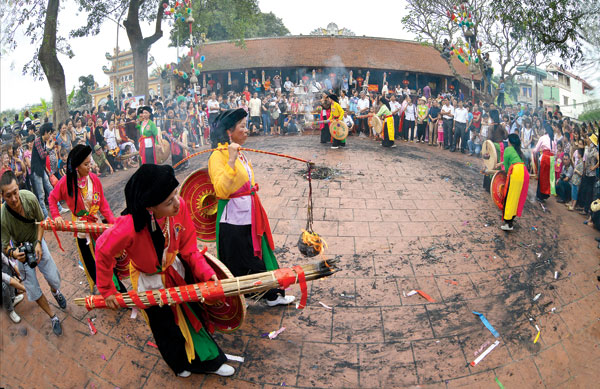(No.10, Vol.6,Dec-Jan 2017 Vietnam Heritage Magazine)



Chuong Village stands on a bank of the mild Day River, in Phuong Trung Commune, Thanh Oai Prefecture of Hanoi. It used to be famous for the palm leaf hats that the villagers made for queens and princesses of many generations of kings. The village’s traditional palm leaf hat trade is still preserved today.
Chuong is also famous for the ‘Chuong village festival’ that takes place every 10th of the 3rd lunar month (which is April 16 this year), with a Rice Cooking Contest and traditional games, such as human chess game, lion dance, etc. The festival’s centerpiece is, of course, the rice cooking contest, soaked in the spirit of North Vietnamese folklore.
The folks believe that the contest was first organized during the time of the Hung Kings (258 BC) by a talented general named Phan Tay Nhac, in order to train his soldiers to make food in extreme conditions.
Villagers in Chuong compete to
demonstrate that they can make
rice under any condition
Some villages of North and Mid-Vietnam do have a rice cooking contest in their festive occasions that shows their local specialty, such as cooking in a boat, cooking while nursing a child, or cooking while walking.
The contest at Chuong normally has four teams, each consisting of 3 village girls in Northern traditional festive dresses. They must get a pot of rice well-cooked within 23 minutes. After the announcement, a drum roll signals the countdown. The girls quickly clean the rice and put it in 2 pots. The pots are hung on two ends of a bamboo stick and a girl holds the stick on her shoulder and walks around a circle 1.5m in diameter. The other two hold a burning straw wisp and follow a pot, heating it from below. The winner is the team whose rice is ready first. If two or more teams have their rice done at the same time, then the team whose rice tastes the best wins.
Sometimes, the rules at Chuong contest get even tougher. The teams have to cook and nurse a baby and herd a toad inside the circle at the same time. Winner is the team that finishes cooking first, while making sure the baby is happy and the toad doesn’t get out of the circle. The local elders say that the circle symbolizes heaven; the toad brings rains. So keeping the toad inside the circle means praying for good weather, favorable for crops.
A Chuong contest can be masculine, too. Each male contestant sits alone in a small boat with rice, water, firewood and a pot at the ready. After the signal, the men paddle towards a finish line, cleanse the rice, make a fire and cook. The one who reaches the finish line first with his rice well-cooked wins.

